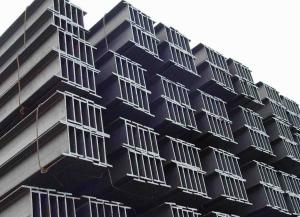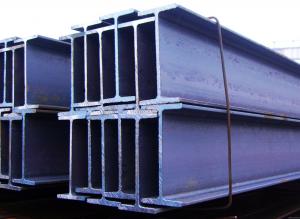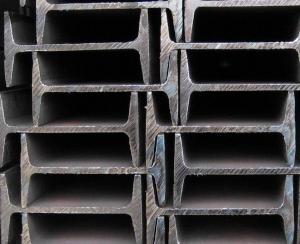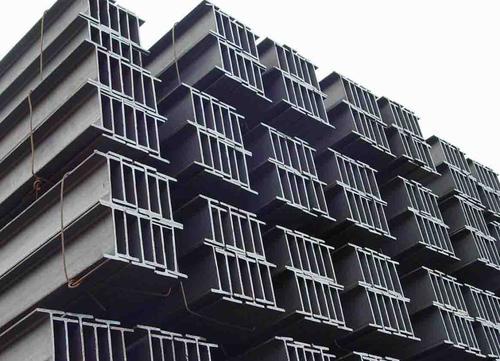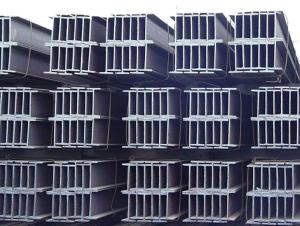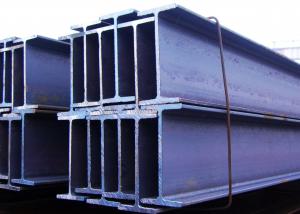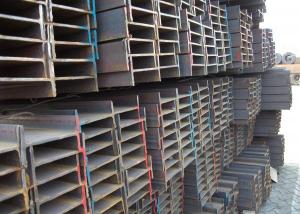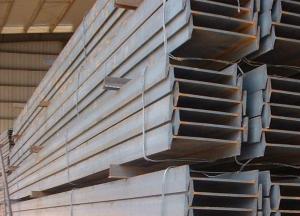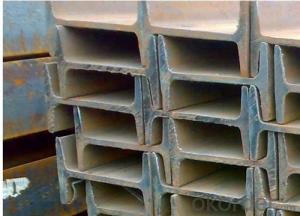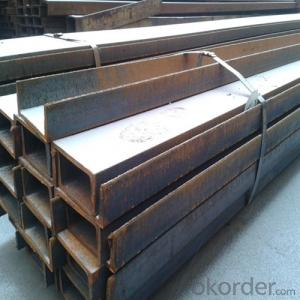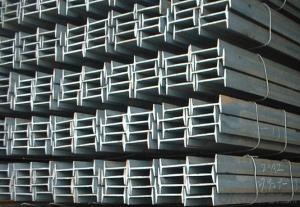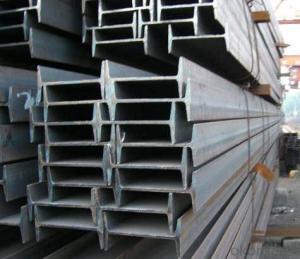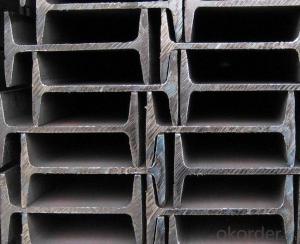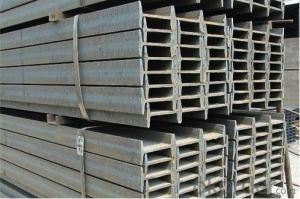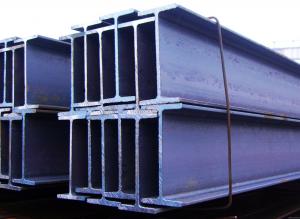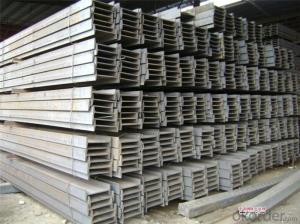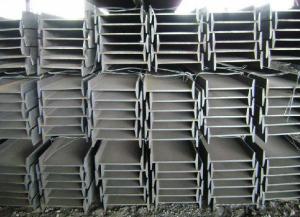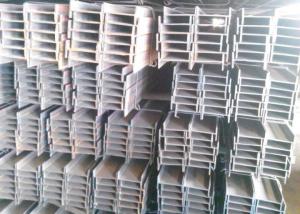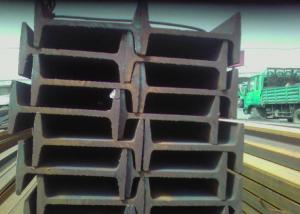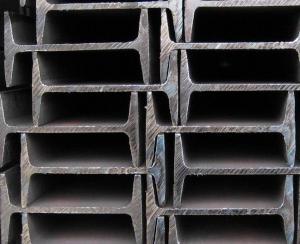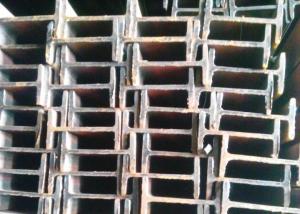IPE/IPEAA Beams with Material Grade GB-Q235
- Loading Port:
- Tianjin
- Payment Terms:
- TT OR LC
- Min Order Qty:
- 25 m.t.
- Supply Capability:
- 10000 m.t./month
OKorder Service Pledge
OKorder Financial Service
You Might Also Like
Product Description:
OKorder is offering high quality Hot Rolled Steel I-Beams at great prices with worldwide shipping. Our supplier is a world-class manufacturer of steel, with our products utilized the world over. OKorder annually supplies products to European, North American and Asian markets. We provide quotations within 24 hours of receiving an inquiry and guarantee competitive prices.
Product Applications:
1. Supporting members, most commonly in the house raising industry to strengthen timber bears under houses. Transmission line towers, etc
2. Prefabricated structure
3. Medium scale bridges
4. It is widely used in various building structures and engineering structures such as roof beams, bridges, transmission towers, hoisting machinery and transport machinery, ships, industrial furnaces, reaction tower, container frame and warehouse etc.
Product Advantages:
OKorder's Steel I-Beams are durable, strong, and resist corrosion.
Main Product Features:
· Premium quality
· Prompt delivery & seaworthy packing (30 days after receiving deposit)
· Corrosion resistance
· Can be recycled and reused
· Mill test certification
· Professional Service
· Competitive pricing
Product Specifications:
1. Invoicing on theoretical weight or actual weight as customer request
2. Standard: EN10025, GB Standard, ASTM
3. Grade: Q235B, Q345B, SS400, ASTM A36, S235JR, S275JR
4. Length: 5.8M, 6M, 9M, 12M as following table
5. Sizes: 80mm-270mm
Dimensions(mm) | |||||
h | b | s | t | Mass Kg/m | |
IPE80 | 80 | 46 | 3.80 | 5.20 | 6.00 |
IPE100 | 100 | 55 | 4.10 | 5.70 | 8.10 |
IPE120 | 120 | 64 | 4.80 | 6.30 | 10.40 |
IPE140 | 140 | 73 | 4.70 | 6.90 | 12.90 |
IPE160 | 160 | 82 | 5.00 | 7.40 | 15.80 |
IPE180 | 180 | 91 | 5.30 | 8.00 | 18.80 |
IPE200 | 200 | 100 | 5.60 | 8.50 | 22.40 |
IPE220 | 220 | 110 | 5.90 | 9.20 | 26.20 |
IPE240 | 240 | 120 | 6.20 | 9.80 | 30.70 |
IPE270 | 270 | 135 | 6.60 | 10.20 | 36.10 |
FAQ:
Q1: Why buy Materials & Equipment from OKorder.com?
A1: All products offered byOKorder.com are carefully selected from China's most reliable manufacturing enterprises. Through its ISO certifications, OKorder.com adheres to the highest standards and a commitment to supply chain safety and customer satisfaction.
Q2: How do we guarantee the quality of our products?
A2: We have established an advanced quality management system which conducts strict quality tests at every step, from raw materials to the final product. At the same time, we provide extensive follow-up service assurances as required.
Q3: How soon can we receive the product after purchase?
A3: Within three days of placing an order, we will begin production. The specific shipping date is dependent upon international and government factors, but is typically 7 to 10 workdays.
Images:
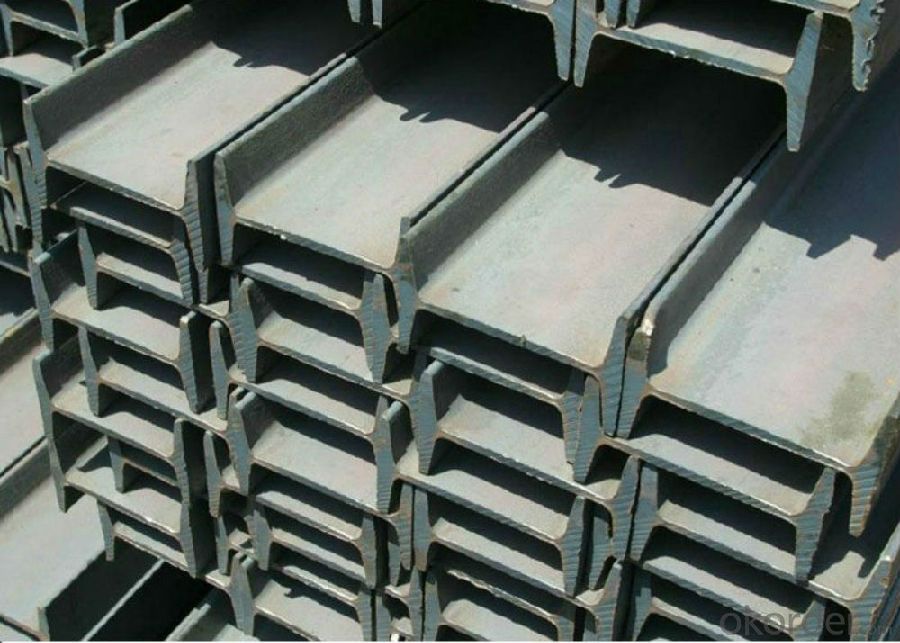
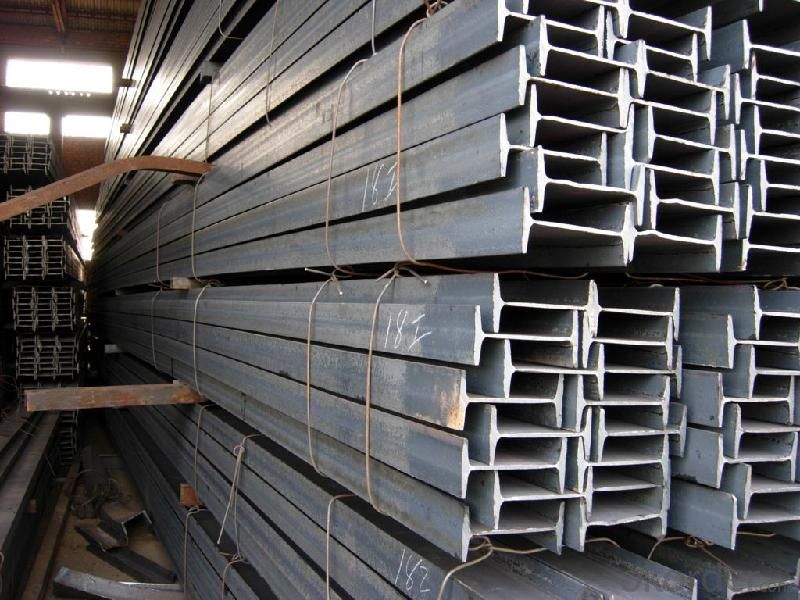
- Q: Can steel I-beams be used in energy-efficient building designs?
- Yes, steel I-beams can be used in energy-efficient building designs. Steel is a durable and versatile material that can support large loads and provide structural stability. It can be incorporated into energy-efficient building designs by using insulated panels, efficient glazing systems, and incorporating renewable energy sources. Additionally, steel is recyclable, which aligns with sustainable practices in construction.
- Q: What are the typical deflection limits for steel I-beams?
- Steel I-beams have varying deflection limits depending on their application and design requirements. Structural engineering commonly follows general guidelines and standards in this regard. In most cases, the deflection limits for steel I-beams are determined by the beam's span length and the load it is expected to carry. Typically, the deflection limit is expressed as a ratio of the beam's deflection to its span length. For beams supporting live loads, like floor or roof beams, the deflection limit usually falls within the range of L/360 to L/240, where L represents the span length. This means that the beam's deflection should not exceed 1/360th to 1/240th of its span length. On the other hand, beams supporting dead loads, such as those in a building's structure, have more stringent deflection limits. In such cases, the deflection limit can be as low as L/480, ensuring minimal sagging or bending under the weight of the structure. It is important to note that these deflection limits are general guidelines and can vary based on specific design requirements, load conditions, and building codes in different regions. Structural engineers and designers are responsible for determining the appropriate deflection limits for each project, considering its unique requirements. Overall, the establishment of deflection limits for steel I-beams aims to maintain structural integrity and functionality while ensuring a safe and stable design.
- Q: How are steel I-beams measured?
- When measuring steel I-beams, their height, width, and weight per unit length are typically taken into account. The height, also referred to as the beam depth, is measured from the top to the bottom of the vertical part of the I-beam. The width, known as the flange width, is measured from one end of the horizontal section to the other. These measurements play a vital role in determining the overall size and load-bearing capacity of the I-beam. Apart from the height and width, the weight per unit length is also measured to determine the mass of the I-beam. This is crucial in calculating the structural strength and load-carrying capacity of the beam. To ensure uniformity in measurements and facilitate easy comparison and selection of I-beams for different construction purposes, industry standards such as ASTM or EN are typically followed. These standards guarantee consistency and enable straightforward evaluation and choice of I-beams. It should be noted that steel I-beams can come in various sizes and shapes, including wide flange beams, H-beams, and S-beams, among others. Each type of beam has its own unique measurements and specifications. Therefore, it is indispensable to refer to the manufacturer's specifications or engineering guidelines when accurately measuring and selecting the appropriate steel I-beam for a specific construction project.
- Q: Are steel I-beams resistant to impact or blast loads?
- Steel I-beams are known for their high strength and durability, making them suitable for a wide range of structural applications. In terms of resistance to impact or blast loads, steel I-beams generally exhibit excellent performance. When subjected to impact loads, such as heavy objects falling or collisions, steel I-beams have a high capacity to absorb and distribute the applied load. The structural properties of steel, including its high tensile strength and ductility, allow it to deform and absorb energy without significant damage. This makes steel I-beams more resistant to impact loads compared to other materials. Similarly, steel I-beams can also provide significant resistance against blast loads, which are sudden and high-intensity pressure waves generated by explosions. The inherent strength and stiffness of steel allows it to withstand the dynamic forces associated with blast loads. Additionally, the weight and rigidity of steel I-beams contribute to their ability to resist the pressure and distribute the energy generated by a blast. It is important to note that the specific resistance of steel I-beams to impact or blast loads can vary depending on factors such as the size and design of the beam, the type and magnitude of the load, and the overall structural configuration. Therefore, engineering analysis and design considerations are essential to ensure the appropriate selection and placement of steel I-beams to withstand impact or blast loads in a given application.
- Q: Can steel I-beams be used for column support?
- Yes, steel I-beams can be used for column support.
- Q: In the welding of steel structure, the welding between I-beam and stiffener needs three sides to be welded
- In the welding of steel structures, the welding between the I-beam and the stiffener needs no welding on all three sides. This is because in the I-shaped steel, stiffened plate is a contact component, the main function is to improve the structure rigidity, so the weld stiffened plate can adopt continuous welding, but in order to avoid the stress concentration, the stiffened plate head and tail must be "angle welding (right angle position of the stiffened plate down 45 degrees). Intermittent weld length, according to the specifications of steel structure size selection.
- Q: What are the different types of steel surface treatments available for I-beams?
- Different surface treatments are available for I-beams, each with their own advantages and uses. 1. Hot-dip galvanizing is a widely used method that involves immersing the I-beam in molten zinc. The zinc coating provides excellent resistance to corrosion, making it ideal for outdoor applications. It also acts as a barrier against moisture and physical damage. 2. Powder coating is a process where a dry powder is applied to the surface of the I-beam and then heated and cured to create a durable and visually appealing finish. Powder coating offers a wide range of colors and textures, making it popular for architectural and aesthetic purposes. 3. Epoxy coating is a two-part system consisting of a resin and a hardener. It offers excellent resistance to chemicals and corrosion, making it suitable for industrial settings where the I-beams may be exposed to harsh environments or chemicals. 4. Paint coating is a traditional method where paint is applied to the surface of the I-beam. While it provides some protection against corrosion, it is generally less durable compared to other surface treatments. Paint coatings are often used for indoor applications or when aesthetics are the main concern. 5. Shot blasting is a mechanical treatment that involves propelling small steel shots at high speeds to remove rust, scale, and other contaminants from the surface of the I-beam. This process creates a clean and rough surface, allowing for better adhesion of subsequent coatings or paints. When selecting a steel surface treatment for I-beams, it is important to consider the specific requirements and environmental conditions. Seeking advice from a professional or a steel manufacturer can help determine the most suitable treatment for a particular application.
- Q: Are steel I-beams suitable for supporting rooftop solar panels?
- Absolutely, steel I-beams are indeed a suitable option for providing support to rooftop solar panels. Construction experts frequently employ steel I-beams in their projects owing to their remarkable strength, durability, and capacity to bear heavy loads. These beams offer exceptional stability, enabling them to withstand the weight of solar panels along with various external factors like wind, snow, and diverse environmental conditions. Furthermore, steel I-beams provide the advantage of adaptability in design, allowing for customization in accordance with the specific demands of solar panel installations. In conclusion, steel I-beams are an extensively relied upon and dependable choice when it comes to supporting rooftop solar panels.
- Q: Are steel I-beams suitable for long-span bridges?
- Yes, steel I-beams are suitable for long-span bridges. Steel I-beams are widely used in bridge construction due to their high strength-to-weight ratio and ability to support heavy loads over long distances. They are capable of spanning large distances while maintaining structural integrity and stability. Additionally, steel I-beams have excellent durability and resistance to environmental factors such as corrosion, making them suitable for long-span bridges that may be exposed to harsh weather conditions. The flexibility of steel also allows for the creation of various bridge designs, including suspension bridges and cable-stayed bridges, which can span even longer distances. Overall, steel I-beams are a reliable and commonly used choice for constructing long-span bridges.
- Q: Can steel I-beams be used for rooftop equipment supports?
- Yes, steel I-beams can be used for rooftop equipment supports. They provide strong structural support and are commonly used in construction for this purpose.
Send your message to us
IPE/IPEAA Beams with Material Grade GB-Q235
- Loading Port:
- Tianjin
- Payment Terms:
- TT OR LC
- Min Order Qty:
- 25 m.t.
- Supply Capability:
- 10000 m.t./month
OKorder Service Pledge
OKorder Financial Service
Similar products
Hot products
Hot Searches
Related keywords
